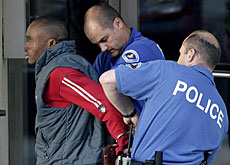Geneva’s police chief does herself justice

The new head of police in Geneva tells swissinfo how her reforms to the service will help it better meet the needs of the booming international city.
Monica Bonfanti is currently preparing Geneva for its biggest challenge to date: the 2008 European football championships, which Switzerland is jointly hosting with Austria.
The 36-year-old forensic specialist has been chief of police since August 1 and is in charge of 1,700 employees in the cantonal police service.
Bonfanti aims to shake up a force that has been dogged by allegations of infighting and racism. It also came in for criticism over its handling of riots in Geneva in 2003 during the G8 summit in Evian, in neighbouring France.
swissinfo: What do you make of your appointment?
Monica Bonfanti: I think my appointment signifies a change, that women of today feel able to fill the posts normally taken by men. Society is now more accepting of this type of ambition, especially in Geneva which is very open to women and minorities. Although I don’t happen to be from Geneva or even the French-speaking part of the country.
swissinfo: How has the initial phase of your new job gone, coming shortly after a turbulent period and leadership crisis in the Geneva police force?
M.B.: I was able to observe the crisis from within, as I was actually already working for the police before August 1. I believe these problems to be behind us now, given the structural and personnel changes that have been carried out.
I also had luck with the issues that I dealt with first. For example, I looked into the issue of expanding bullets, which I had already worked on in my former job at the Geneva police.
swissinfo: What are the greatest challenges facing the Geneva police in terms of organisation?
M.B.: There has to be a stop to the compartmentalised way of thinking. We have a police force, a crime squad, an international security police force and administrative personnel.
We have to consider what the police should be doing. This is what the people expect from us. We have to leave behind the infighting that has been taking place in the police.
swissinfo: Why have you have called for foreign police reinforcements for Euro 2008?
M.B.: We will appeal first to our colleagues in the rest of the French-speaking part of the country and in Italian-speaking Ticino. But there will be a huge need for police.
Four cities are directly affected by the event in Switzerland: Geneva, Bern, Basel and Zurich. But other towns will also have to manage events such as big screen match retransmissions. Security measures will be required here too.
This is why we have asked German police for their help. For its part, the Swiss government is trying to enlist the help of the French police, in particular for Geneva.
What form this support takes will be decided by the cantons concerned, in tandem with the government.
Dialogue should help to solve many problems. We are also looking at the work carried out by sociologists during the football world cup in Germany to know how to deal with fans and reduce tension. Because, let’s not forget, its supposed to be a fun event and not a repetition of the Evian G8.
swissinfo: Geneva is turning into a metropolis stretching beyond the cantonal boundaries. Are we moving towards a regional and cross-border police service?
M.B.: It’s clear that as society changes so must the police. We have a strategy unit, made up of sociologists and criminologists, which follows these developments so we can adapt our structure and police responses.
Furthermore, the Centre for Police and Customs Cooperation allows for better cooperation with neighbouring France. We are determined to improve these ties.
We already have mixed French-Swiss patrols keeping watch over the whole Geneva region. This is not counting the platforms which bring together officials from Geneva and the French border areas which allow us to share our experiences and anticipate any problems.
New crime trends that come up in France often end up in Geneva and in Switzerland.
swissinfo: What are you doing to counter the terrorist threat in Geneva?
M.B.: The Analysis and Prevention Service [in the Federal Police Office] in Bern is in change of collecting information and of cooperation with different police divisions. That said, in Geneva we don’t underestimate the threat, and we place particular emphasis on information – a key step, as the foiled attacks in London this summer showed.
swissinfo-interview: Frédéric Burnand in Geneva
Monica Bonfanti, who is 36-years-old, has been head of the Geneva police since August 1, 2006. Originally from Lucerne, she has taken over from Urs Rechsteiner, who resigned on health grounds.
After studying at the forensic science and criminology institute at Lausanne University, she was appointed assistant professor while also doing internships in different polices forces, including abroad.
In 2000 she took over as head of the Geneva police forensic service.

In compliance with the JTI standards
More: SWI swissinfo.ch certified by the Journalism Trust Initiative











You can find an overview of ongoing debates with our journalists here . Please join us!
If you want to start a conversation about a topic raised in this article or want to report factual errors, email us at english@swissinfo.ch.